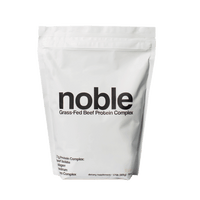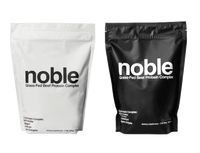
Understanding Steak Nutrition Facts
Share
How does steak fit into your balanced eating plan? Steak is a popular protein source, loved for its mouth-watering taste and impressive nutrient profile.
This article will guide you through the essential facts about steak nutrition - from health benefits and macronutrient breakdown to the difference between grass-fed and grain-fed beef.
Get ready to eat your new favorite food!
Key Takeaways
- Steak is full of protein and essential vitamins, helping to build muscles and boost your immune system.
- It's vital to watch serving sizes when eating steak; a healthy portion is about the size of a deck of cards.
- Different types of steak have varying levels of Fat and calories, so choose wisely based on your dietary needs.

Calories & Nutrition in Various Steak Cuts
Steak is a versatile and nutritious source of protein, but not all cuts are created equal.
Here's how a 3-ounce portion of different popular cuts of steak stack up in terms of calories and nutrients:
| Steak Cut | Calories | Total Fat (g) | Protein (g) |
|---|---|---|---|
| Beef Tenderloin | 179 | 7.6 | 24 |
| Ribeye | 206 | 12.8 | 23 |
| T-Bone | 210 | 13.4 | 22 |
| Sirloin | 207 | 13.3 | 23 |
| New York Strip | 216 | 14 | 23 |
Adding butter to your steak during cooking can add 100 calories and 11 grams of Fat per tablespoon.
Recipes vary, but knowing these baseline numbers can help you plan your meals to meet your nutritional needs.
Whether you opt for a lean tenderloin or a rich ribeye, steak offers a delicious way to get your daily protein.
The Macronutrient Profile of Steak
Let's dive into the macronutrient profile of steak. Forget carbs, steak is virtually carbohydrate-free. Fats? Yes, it has them - both saturated and unsaturated fatty acids.
However, the shining star in steak nutrition is protein - high-quality animal protein packed with all the essential amino acids you need for muscle building and maintenance.
Carbohydrates
Steaks are a dream come true for those on low-carb and sugar-free diets.
They naturally contain zero carbohydrates, making them an ideal choice if you're looking to reduce your carb intake or control your blood sugar levels.
This also means they have no fiber or sugars, which benefits individuals following keto, paleo, or carnivore diet plans.
Eating steak can help stave off cravings that often accompany high carbohydrate consumption.
High-protein foods like steak take longer to digest than carbs, keeping you full and promoting weight loss and maintenance.
Just remember not to pair it with high-carb sides! Instead, opt for vegetables or a simple salad to maintain the balance of your nutritious meal.
Fats
Grass-fed steak boasts a more favorable fatty acid profile than grain-fed, making it an excellent choice for those mindful of fats.
A 3-ounce serving of grilled beef tenderloin with the Fat trimmed only has 7.6 grams of this macronutrient.
What's more, cooking methods can also impact the fat content significantly.
For instance, adding butter when cooking your steak injects an additional 11 grams per tablespoon.
Considering these factors helps balance your intake of saturated and unsaturated fatty acids while enjoying this delicious source of animal proteins.
Protein
Steak stands as a powerhouse of high-quality protein, which serves as building blocks for your muscles and bones.
Your body needs all the essential amino acids to repair cells and make new ones - steak provides them all.
Especially beneficial if you're following a carnivore diet or are a meat lover, consuming steak can significantly contribute towards meeting your daily protein intake requirements.
It's not just about quantity but also quality; animal protein like that found in steak is far more bioavailable than plant sources, ensuring maximum absorption by the body.
Whether you want to build or maintain muscle mass, adding steak to your meals is wise.

Essential Vitamins & Minerals in Steak
Steak boasts a wealth of vital vitamins and minerals contributing to overall health.
Iron is a standout nutrient found in steak, crucial for carrying oxygen throughout your body and preventing fatigue or anemia symptoms.
Notably, the iron in steak is heme iron, which your body absorbs more efficiently than non-heme sources like plants.
The benefits continue! Steak also comes packed with vitamin B12, essential for cognitive function and the production of red blood cells.
This juicy meat also features niacin—or vitamin B3—to help convert food into usable energy while bolstering digestive health.
Other necessary minerals, such as zinc, contribute to immune health and wound healing, while selenium is pivotal in maintaining thyroid function.
Moreover, if you opt for grass-fed steak—you gain an improved fatty acid profile boasting high omega-3 fatty acids!
Health Benefits of Consuming Steak
Chow down on a juicy steak, and you're not just indulging your taste buds. You're also feeding your body with vital nutrients!
We are packed with high-quality protein, and steak aids in muscle retention - a crucial factor, especially as we age to combat sarcopenia.
It's an immune system booster, too, thanks to essential micronutrients like zinc that help keep you fighting fit.
If you suffer from iron deficiency anemia, the heme iron in steak supports red blood cell production for healthy oxygen transportation throughout your body.
Moreover, it provides heart-healthy nutrients such as unsaturated fatty acids and Vitamin B12, which are associated with a lower risk of cardiovascular diseases. (1)
Finally, studies hint at a potential role for lean cuts of red meat in diabetes prevention by stabilizing blood sugar levels due to its low carbohydrate content.
Reduces Muscle Wasting
Muscle wasting can be a severe issue, particularly as we age. Due to its rich protein content, consuming steak offers an efficient way to tackle this problem.
The high-quality proteins in steak are complete with all essential amino acids needed for muscle growth and repair. (2)
This helps maintain muscle mass and prevents the progression of conditions like sarcopenia, which is common in older adults.
So, next time you sit down to a juicy steak, know it's doing more than just satisfying your taste buds; it's helping preserve your muscles, too!
Enhances Immunity
Steak doesn't just satisfy your taste buds; it's also a powerful tool for boosting your body's immunity.
A delicious steak meal is a rich source of protein and zinc, two critical factors for maintaining a robust immune system. (3)
The vitamin A and E precursors found in higher quantities in grass-fed beef further enhance immune health.
So next time you savor that juicy cut of steak, remember it's pleasing your palate and bolstering your health defenses!
Lowers Risk of Anemia
Steak is a powerhouse of iron, providing essential fuel for your body to produce red blood cells. This high-quality protein source becomes an effective tool in the fight against anemia.
Iron deficiency, the leading cause of anemia, can lead to fatigue and weakness, making it difficult for people to complete their daily tasks with total energy.
Regular intake of steak supplies enough iron that aids in preventing these symptoms associated with anemia by ensuring proper oxygen supply throughout the body. (4)
Thus, carving out a room on your plate for steak could mean taking significant strides toward combating iron deficiency and reducing the risk of developing anemia.
Provides Heart-Healthy Nutrients
Steak supplies your heart with the essential nutrients it needs to function optimally.
Among these valuable components are unsaturated fats, particularly omega-3 fatty acids, associated with lower chances of developing heart diseases.
Grass-fed beef piles up even more points because they contain higher amounts of omega-3 compared to grain-fed counterparts.
B6 and B12, also found generously in steak, play a critical role in controlling homocysteine levels.
High homocysteine levels can damage blood vessels, leading to complex clotting problems and heart conditions.
Therefore, including steak in your diet will satisfy your palate and contribute positively towards maintaining a healthy heart!
Potential Role in Diabetes Prevention
Grass-fed steak, with its healthier fatty acid profile and lower fat content, has shown promise in aiding diabetes prevention.
The presence of conjugated linoleic acid (CLA), a ruminant trans fat found in grass-fed beef, enhances insulin sensitivity, which can help ward off this chronic disease. (5)
Consuming unprocessed, lightly cooked red meat as part of a balanced diet is not only delicious.
Still, it may also contribute to regulating blood sugar levels for carnivore diet followers and meat lovers alike.

The Difference between Grain-fed and Grass-fed Steak
Grass-fed and grain-fed steaks present two significantly different nutritional compositions. Grass-fed steak maintains a lower total fat content than its grain-fed counterpart, making it the leaner choice of the two.
This doesn't mean grass-fed steak lacks flavor or tenderness; many people have come to prefer its naturally robust taste.
Notably, the fatty acid profile in grass-fed beef is more favorable with higher amounts of precursors to vitamins A and E. These nutrients are crucial in maintaining overall health, including immune function and eye health.
Additionally, research suggests that choosing this type of steak may provide specific health benefits such as reduced risk of heart disease due to an increased Omega-3 fatty acids content compared to conventional grain-fed beef.
Conclusion
Indulging in a steak is more than just a culinary delight; it's an infusion of essential nutrients that bolster muscle retention, enhance immunity and combat anemia.
The choice between grain-fed and grass-fed further tailors its nutritional profile, especially its fatty acid composition.
But to truly harness the power of a carnivore diet, why not complement your steak with a broader spectrum of nutrients? Noble Origins is here to elevate your nutritional journey.
Our Noble Organs Complex offers a concentrated blend of vital nutrients from grass-fed beef organs.
And for those seeking a comprehensive protein boost, our Nose-To-Tail Protein With Organs, Collagen, & Colostrum is the perfect addition to your regimen.
As you savor the richness of steak, remember that with Noble Origins, you're embracing a holistic approach to carnivore nutrition.
Dive deeper into the ancestral health world and let every bite be a step towards optimal well-being.
Discover the Full Spectrum of Carnivore Nutrition with Noble Origins.
FAQs
What is the nutritional value of steak?
Steak is a rich source of high-quality protein, providing essential vitamins and minerals such as iron, vitamin B12, niacin, selenium, and zinc. It also contains beneficial monounsaturated and polyunsaturated fats with zero carbohydrates.
How does steak fit into a healthy diet?
Steak can be a valuable component of a balanced diet due to its high protein content, zero sugars, and beneficial unsaturated fats. Consuming in moderation and with various vegetables can contribute to a nutritious meal.
What are the healthiest ways to cook steak?
Opt for lean cuts or grass-fed beef, which typically have a better fatty acid profile. Cooking methods like broiling, grilling, and roasting can preserve the meat's nutritional value while reducing the need for added fats.
Why is food safety crucial when dealing with raw steak?
Ensuring food safety is paramount when handling raw steak to avoid bacterial contamination. Always store steak properly and adhere to USDA-recommended cooking temperatures to ensure safe consumption.
How can portion control enhance steak's nutritional benefits?
Choosing a smaller serving size of steak allows you to enjoy its nutritional benefits without overconsuming calories and fats. This approach promotes balanced eating and informed decision-making.
Do different steak cuts vary in nutritional content?
Various cuts like flank steak or top sirloin differ in calorie and nutrient content. However, most steak cuts provide significant health benefits, including high-quality protein and essential vitamins and minerals.
Related Studies
- A study published on the Journal of Agricultural and Food Chemistry suggests that beef is a good source of unsaturated fatty acids and vitamin B12, which have potential cardiovascular health benefits.
- A review article published on the Journal of Cachexia, Sarcopenia and Muscle suggests that protein intake plays a crucial role in preventing muscle wasting and sarcopenia.
- A study published on the Journal of Nutrition suggests that zinc plays a crucial role in immune system function.
- An article on Y.O. Ranch Steakhouse's website explains that heme iron in steak can help lower the risk of anemia.
- A study published on the Journal of Nutritional Biochemistry suggests that conjugated linoleic acid (CLA) in grass-fed beef may have a potential role in diabetes prevention by improving insulin sensitivity.



